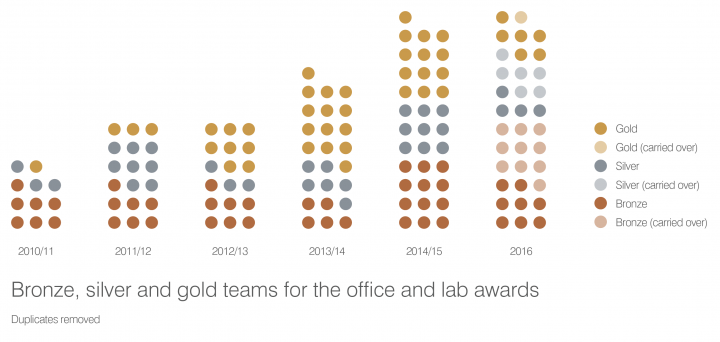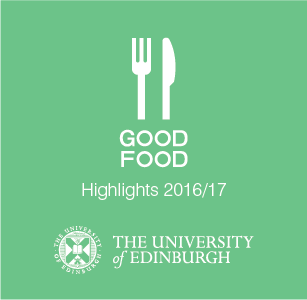Sustainable estates
A number of programmes have been delivered to support positive behaviours on campus.

Energy efficiency
This has included audits of buildings across campus to identify potential energy efficiencies, supporting a network of over 100 Energy Coordinators to help raise awareness of energy saving actions across the University community by disseminating information, developing a climate adaptation strategy and ensuring more robust methodologies and tools to support carbon reporting.
In the last year, over 20 buildings were audited to identify energy saving opportunities, especially in relation to potential infrastructure projects, alterations to Building Energy Management Systems and behaviour change initiatives.
Energy Coordinators
The sustainable campus fund is an internal investment vehicle to invest in opportunities that reduce our energy, which bring carbon savings, financial savings and real energy saving.
Sustainable Campus Fund
Sustainability Awards
The Sustainability Awards recognise staff and students who make a difference and contribute towards the University becoming more socially responsible and sustainable. Since the Sustainability Awards launched in 2010, an increasing number of staff and students have taken part every year. 35 sections of the University from every campus, group and college are now involved, finding new ways to conserve resources, save energy, streamline scientific and research practices, fundraise for good causes and build links with the local community.
The Awards are part of the National Union of Students’ Green Impact environmental accreditation scheme, which runs in over 50 UK further and higher education institutions. The lab awards are also based on the criteria of the international S-Lab programme.
A total of 17 teams received Office Awards for 2016, including seven new teams. 12 teams also carried over their awards from last year as part of the two year accreditation. Seven lab teams participated in 2016, including one new team. In addition to this, five other teams carried over their awards from last year as part of the two year accreditation.
Students from 9 student halls participated in the Residence Awards, with all teams receiving recognition for their efforts. A total of 78 students actively participated in the teams, promoting sustainability and outreaching to over 3,300 student residents in halls. A further 5 student led projects also received Student Awards.

Supporting positive behaviours
Reuse of materials, and routes for reuse, continues to grow. This has been helped by forging good relationships with external organisations, improving various channels of communication and increasing the number of staff using Warp It, the internal reuse portal. The University's Accommodation, Catering and Events department have provided reusable goods to the British Heart Foundation worth over £130,000, directly supporting research. The internal reuse network, Warpit, has led to over 21 tonnes of waste being diverted from landfill, since its launch in 2013.
With support from Cycling Scotland and Sustrans, the University has launched a range of initiatives, including Spring into Cycling, with the aim of reducing some of the barriers associated with cycling and encourage more students and staff to "take to the saddle". A new Integrated Transport Plan 2017 - 2021 was agreed, setting out strategic targets and actions for the various methods of travel to and between our campuses. This includes targets to increase the proportion of staff and students walking and cycling, as well as increasing the proportion of electric vehicles in the University's fleet.
Business Travel data
This chart shows the University's business travel emissions over time.
Following the development of a more sophisticated system to analyse the University's business travel, we have updated data from previous years to use the newest available figures.
Good Food Policy

Accepting that the current food system contributes to climate change and other sustainability challenges, the University is working to support more sustainable food systems by embedding ‘Good Food’ across our institution.
We define Good Food as food and drink that is tasty, healthy, good for the environment and good for the people who make it. It is produced, purchased, transported, consumed and disposed of within food systems that are environmentally, socially and economically sustainable.
In August 2016, the University approved its first Good Food Policy to drive progress in five key areas – Sourcing, Provision, Practice, Research Learning & Teaching and Leadership & Culture.
The Policy was developed in partnership by the Department for Social Responsibility and Sustainability (SRS), the Department for Accommodation, Catering and Events (ACE) and the Procurement Office. It builds on previous ACE achievements the University’s Fair Trade Policy and our Procurement Strategy.
Our departments will be working together to ensure implementation of the policy.
Good Food Policy

